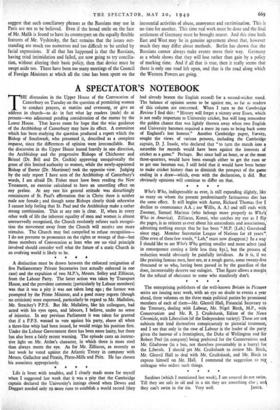A distinction must be drawn between the enforced resignation of
five Parliamentary Private Secretaries (not actually enforced in one case) and the expulsion of two M.P.'s, Messrs. Solley and Zilliacus, from the Labour Party. The latter action was taken by Transport House, and the prevalent comment (particularly by Labour members) was that it was a pity it was not taken long ago ; the former was prompted by the Prime Minister, and a good many regrets (though no criticism) were expressed, particularly in regard to Mr. Mallalieu, Mr. Strachey's P.P.S. But Mr. Mallalieu, like his colleagues, had acted with his eyes open, and labours, I believe, under no sense of injustice. In any previous Parliament it was taken for granted that if a P.P.S. wanted to vote against his party, above all when a three-line whip had been issued, he would resign his position first. Under the Labour Government there has been more laxity, but there has also been a fairly recent warning. The episode casts an instruc- tive light on Mr. Attlee's character, in which there is more steel than always meets the eye. As for Mr. Zilliacus, as recently as last week he voted against the Atlantic Treaty in company with Messrs. Gallacher and Piratin, Platts-Mills and Pritt. He has chosen his associates appropriately.
* * * *










































 Previous page
Previous page